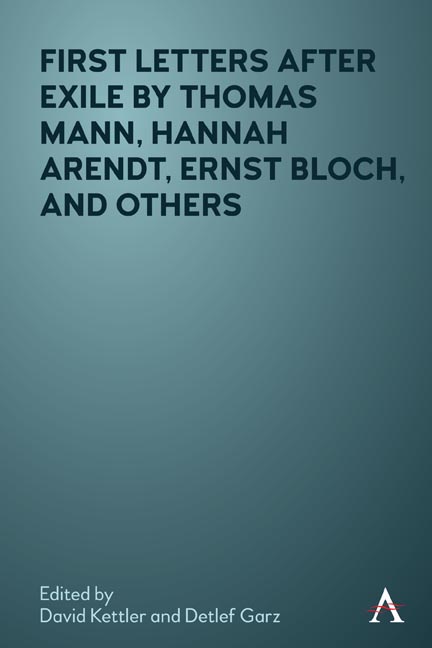Book contents
- Frontmatter
- Contents
- Preface
- Chapter 1 The “First Letters” Exile Project: Introduction
- Chapter 2 “That I Will Return, My Friend, You Do Not Believe Yourself ”: Karl Wolfskehl – Exul Poeta
- Chapter 3 “I Do Not Lift a Stone”: Thomas Mann’s “First Letter” to Walter von Molo
- Chapter 4 Faust Narrative and Impossibility Thesis: Thomas Mann’s Answer to Walter von Molo
- Chapter 5 “That I Am Not Allowed for a Moment to Forget the Ocean of Blood”: Hans-Georg Gadamer and Leo Strauss in Their First Letters after 1946
- Chapter 6 Return into Exile: First Letters to and from Ernst Bloch
- Chapter 7 A Postwar Encounter without Pathos: Otto Kirchheimer’s Critical Response to the New Germany
- Chapter 8 An Exile’s Letter to Old Comrades in Cologne: Wilhelm Sollmann’s Critique of German Social Democracy and Conception of a New Party in Postwar Germany
- Chapter 9 First Letters: Arendt to Heidegger
- Chapter 10 Denazification and Postwar German Philosophy: The Marcuse/Heidegger Correspondence
- Chapter 11 “It Would Be Perhaps a New Exile and Perhaps the Most Painful”: The Theme of Return in Oskar Maria Graf ’s Letters to Hugo Hartung
- Chapter 12 Social Constellation of the Exile at the End of the Second World War and the Pragmatics of the “First Letters”: An Objective Hermeneutic Structural and Sequence Analysis
- Notes on Contributors
- Index
Chapter 4 - Faust Narrative and Impossibility Thesis: Thomas Mann’s Answer to Walter von Molo
Published online by Cambridge University Press: 25 February 2022
- Frontmatter
- Contents
- Preface
- Chapter 1 The “First Letters” Exile Project: Introduction
- Chapter 2 “That I Will Return, My Friend, You Do Not Believe Yourself ”: Karl Wolfskehl – Exul Poeta
- Chapter 3 “I Do Not Lift a Stone”: Thomas Mann’s “First Letter” to Walter von Molo
- Chapter 4 Faust Narrative and Impossibility Thesis: Thomas Mann’s Answer to Walter von Molo
- Chapter 5 “That I Am Not Allowed for a Moment to Forget the Ocean of Blood”: Hans-Georg Gadamer and Leo Strauss in Their First Letters after 1946
- Chapter 6 Return into Exile: First Letters to and from Ernst Bloch
- Chapter 7 A Postwar Encounter without Pathos: Otto Kirchheimer’s Critical Response to the New Germany
- Chapter 8 An Exile’s Letter to Old Comrades in Cologne: Wilhelm Sollmann’s Critique of German Social Democracy and Conception of a New Party in Postwar Germany
- Chapter 9 First Letters: Arendt to Heidegger
- Chapter 10 Denazification and Postwar German Philosophy: The Marcuse/Heidegger Correspondence
- Chapter 11 “It Would Be Perhaps a New Exile and Perhaps the Most Painful”: The Theme of Return in Oskar Maria Graf ’s Letters to Hugo Hartung
- Chapter 12 Social Constellation of the Exile at the End of the Second World War and the Pragmatics of the “First Letters”: An Objective Hermeneutic Structural and Sequence Analysis
- Notes on Contributors
- Index
Summary
If personal relations in themselves are never very simple, given human spontaneity and freedom, correspondence by letter across space and time amounts to a risky adventure. The actors have changed; their fate—the design of their lives and interests—is uncertain. The person, whom one once thought to know, now lives on a different shore and in a different world. Simple confidence in previous agreements would be naïve. The project of “first letters” after 1945 is so interesting because it plumbs this general risk of distance communication to its maximal depths. The following text—much revised for the English translation—examines this tension in the case of a very well-known example: Thomas Mann's first reply to two nationalist authors of secondary quality, who saw themselves as parts of the so-called inner emigration and as opponents of National Socialism or the National Socialist worldview, but who were, in contrast, viewed rather as accomplices and collaborators by Thomas Mann: Walter von Molo (1880–1958) and Frank Thieß (Thiess) (1890–1977).
Mann's situation in the emigration was radically different from that of most other German emigrants. At the latest since his Nobel Prize in 1929, he was welcome in the world as author. By virtue of his engagement for the Weimar Republic; his commitment to a socialism—if also idiosyncratically interpreted; and his early and energetic intervention against German nationalism and National Socialism, he stood high on the list of declared enemies of the German regime. Mann left Germany as soon as February 1933, before the enactment of the Ermächtigungsgesetz; he lived several months in Sanary-sur Mer, an assemblage haven for the emigration, and then moved to Zürich: In 1936, he was expatriated and Bonn University withdrew his honorary degree. In 1938, he moved from Switzerland to the United States, where academic circles, publicist forums, and a wide spectrum of lecturing opportunities were open to him. He was soon accounted the “King” of the emigration.
Mann had already taken a political stand before 1933, and he understood himself before 1933 and after 1945 as a German author, who wrote exclusively in the German language and addressed himself primarily to the German public and to the future of the nation.
- Type
- Chapter
- Information
- Publisher: Anthem PressPrint publication year: 2021



